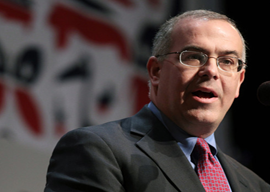
July 06, 2011

David Brooks
Brooks attempts to associate his plan with our first Secretary of the Treasury, Alexander Hamilton. Presumably Hamilton, who wanted to promote industries in the early American republic and who introduced our First National Bank, would have applauded what Brooks is advocating. Unlike his rival Thomas Jefferson, Hamilton did not glorify an agrarian America but called for a commercial republic. Appropriately, Hamilton’s statue still stands prominently on Wall Street, and Hamilton is buried a few blocks away in the cemetery adjoining Trinity Church.
Like most neoconservative publicists, Brooks sees Hamilton as someone who can be made to fit a modern big-government agenda. An author of our Constitution who lived in the incipient Big Apple and an early advocate of an effective central government, Hamilton has long been a hero to such government consolidators as Brooks and Kristol. But Hamilton’s legacy has been deceptively reconstructed, and he would not likely recognize himself in his latter-day disciples.
There is nothing to suggest this state-builder believed in a modern welfare state. What he supported was the emergence of a prosperous commercial class which would form an American nation-state’s basis. Toward this end, Hamilton favored tariffs and banks that would provide the right sort of people with investment credit. He certainly had no interest in redistributing income, getting the federal union to provide citizens with entitlements, or preaching “human rights.” Hamilton hated the French Revolution for the same reasons Edmund Burke did. He looked upon its global democratic mission (to use Burke’s phrase) as an “armed doctrine” that threatened societies that differed from revolutionary France. Jefferson long enthused over the French Revolution, but for Hamilton, according to his biographer Lawrence S. Kaplan, “Britain would be the bulwark protecting America from the wave of anarchy and atheism then overwhelming Europe.”
Although Hamilton was Washington’s adjutant during the American Revolution, he was at best a reluctant supporter of the American secession. As soon as the revolution was over, he stressed in a letter to his friend, New York Governor George Clinton, the need to fully restore property and rights to British Tories who had been driven out of the state. He believed these royalists, many of whom had fled to Canada, would make “useful citizens” in the new American republic. Hamilton admired the English constitution, with its hereditary monarchy, House of Lords, and national church. Nothing would have delighted his heart more than to have Washington and his descendants turned into American monarchs.
It is hard to imagine that Alexander Hamilton and David Brooks could have agreed on the nature of “national greatness” or on anything else significant. Brooks’s appeal to Hamilton is a game that the poorly educated play to get the even more culturally illiterate to embrace a program that supposedly originated with some long-dead great person. But the “Hamilton agenda” has no more to do with Hamilton than Brooks does with anything truly conservative.